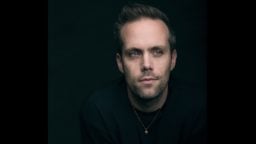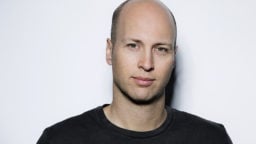Welcome to the latest episode of the Music Business Worldwide Podcast. The MBW Podcast is supported by Voly Music. On this episode, MBW founder Tim Ingham speaks to Bruno Major, a successful independent artist.
How big can an independent artist get without help from a major record label?
It’s been a fierce source of debate at this point for 20 years, ever since the likes of TuneCore launched in the early to mid-noughties.
These days, though, we have the receipts to answer the question.
Take Bruno Major, a fully independent artist and our guest on this episode of the Music Business Worldwide Podcast.
UK-based Major, who releases his music via AWAL and owns his own recordings, has racked up comfortably more than a billion streams on Spotify, where two of his tracks – Nothing and Easily – have over quarter of a billion streams each.
Major recently released his latest singles, We Were Never Really Friends and Columbo, ahead of his third studio album – also called Columbo – which will be out later this summer.
Major is a successful live act, with a tour of Asia, Europe and North America recently confirmed, and he’s previously toured arenas with Sam Smith.
He also has a particularly interesting history with the record business: Major started out in the music industry by signing a major label deal with Virgin Records, then owned by EMI, in Los Angeles.
On this MBW Podcast, Major discusses his experience of being signed to (and then leaving) that major label as a young man, how that experience has helped fuel his career ambitions ever since, and how he keeps himself creatively motivated as an independent artist.
Listen to the full interview above, or read an abridged and edited summary of key elements of the discussion below…
You were a session musician to begin with. What happened when you then signed to a major record company?
I originally intended to be a guitar player. I was aspiring to become Stevie Wonder’s guitar player or Tom Waits’ guitar player.
But I moved down to London, and I think being in the city, the energy, inspired me to start writing. I quickly realized that the combination of words and music [was a] great passion of mine and was really where the magic lay for me.
“I did the thing where you become a buzzy artist, everyone tries to sign you, and then there’s a bidding war. That was fun as a 23-year-old.”
I ended up signing a publishing deal to Sony. Very soon after that, I garnered interest from record labels.
I did the thing where you become a buzzy artist, everyone tries to sign you, and then there’s a bidding war. That was fun as a 23-year-old.
It’s also probably intimidating. Music industry People are using jargon, numbers are getting thrown around. What was your experience of that?
To be honest, I was always quite clear-minded about it. I saw through the BS pretty quickly.
I had meetings where I’d walk into a record label with a guitar and they’d be like, ‘Oh, look, he’s brought a guitar with him. That’s cute.’ And I had people saying, ‘You should be like this [other] male singer-songwriter.”
I ended up signing to what was at the time Virgin Records in America, because they were the only record label that just said, ‘You’re great. Here’s a check.’
“I went back to America with my head held high, bright-eyed, and delivered this thing. And they were like, ‘This is rubbish. We’re not going to release it.’ They actually said it was ‘unreleasable’.”
I signed to them on the premise that they weren’t allowed to come into the studio at all for the entire duration of the album process. I said, ‘I don’t want you there. I don’t want you to have an opinion on my creative process. I don’t want you to give me any A&R whatsoever.’ They were like, great.
Six months later, I’d recorded [the album] in England [and] I went back to America with my head held high, bright-eyed, and delivered this thing. And they were like, ‘This is rubbish. We’re not going to release it.’ They actually said it was ‘unreleasable’.
So yeah, that was the end of my tenure with them.
How did it make you feel for someone to say tHe album was ‘unreleasable’? What was the impact on your ego and your confidence?
It was brutal. It’s a long way down from there.
I’m from a small town, Northampton in the Midlands [UK]. Success for me growing up was becoming a professional musician of any kind; I would have been over the moon to have become a professional [music] tutor or lecturer or somebody who played gigs at weddings. My dream was to just make a living making music.
But then you get offered a record deal, and Virgin Records fly you over to LA to put you up in a five-star hotel. Suddenly, you’re working with all these [big-name musicians]; I was working with my heroes on this album. And, of course, I told everyone; my parents told all their friends, and they’re like, ‘Oh, Bruno signed a big record deal… [he’s] going to be famous’ and all of that stuff.
“This is not a woe-is-me story; it happens to 90% of people who sign record deals.”
I think it’s interesting, because that’s part of the deceit, in my eyes, of what a record deal is. If you break a [record deal] down to its core, it’s a really expensive bank loan. But it’s been dressed up in a very glamorous way.
Everyone knows [about it] when you get dropped; it was so brutal for me to come back home. I had my record advance, but I’d spent it all, so I didn’t have any money; I didn’t have a career; I didn’t have a fan base at that point.
My confidence had been really badly knocked. This is not a woe-is-me story; it happens to 90% of people who sign record deals.
I’m not saying that bad deals don’t still happen, but this was 10 years ago – a specific moment in time where deals looked a particular way, and record labels arguably controlled artists’ chances of success much more than they do today via radio, press etc.
I agree. I consider myself so fortunate, because when all this happened, it was 2013 or 2014. It was right on the cusp of the transitional period [away] from the old way of doing things: you sign a record deal, the [labels] pay for your album, they put it on the radio, they pay for marketing and touring. And as a result, they take a portion of your income. That’s how it worked.
Now it doesn’t work like that anymore. [In Major’s view], the record deal system is still set up to serve an archaic system, which doesn’t exist anymore, basically.
After getting dropped, when do you start making music again? When do you start believing, ‘oh, maybe I can fashion a small fan base, maybe I can start to earn a living out of this again…’
I remember it really clearly: I was on my sofa, in my pants. I had a huge hangover – that was not an uncommon occurrence at that period in my life. And I was just thinking, ‘What do I do here, because this feels like one of those moments.’
I had a very small amount of money left over from my record advance, and I used it to buy a laptop. I decided that I would learn how to use Logic to make my own records. I’d signed my deal off the back of iPhone voice notes that I’d put up on SoundCloud. So I went on YouTube and started watching [tutorial] videos and learned how to produce. I proceeded to spend 18 months making some really bad electronic music… and that was my learning process.
“I was on my sofa, in my pants. I had a huge hangover – that was not an uncommon occurrence at that period in my life.”
I was also writing songs for other people. I ended up doing a session for an artist called Liv Dawson, we wrote a song called Tapestry, which ended up being her first single. She was being managed by Method [Management], they loved the song and they signed me [as a writer]. I’d just got out my publishing deal with Sony.
In that same session, the producer was Phairo.
I had probably 500 songs that were never released. I was dedicated to my career being a songwriter at this point, I’d kind of given up on the artist thing completely. But I just thought, ‘Why not record these songs just for me?’ So [with Phairo] we started making some songs and putting them out on the internet.
Sam [Bailey], my manager, encouraged me to put it all out independently. That was the initial beginnings of my artistic career.
How did you find the inner strength to say, ‘You know what, I’m going to learn to produce, I’m going to get a laptop, I’m going to start again’?
People always say, if you want to be in the music industry, you’ve got to have a thick skin. And I definitely feel like I have a thick skin.
Obviously, everyone’s got different levels of opportunity and privilege. And I don’t take that for granted.
But there was definitely no way that I was going to live in a universe where I’m still sat on the sofa five years [on], still hungover and still with no career.
Let’s talk finances: Generally, when did you start to realize you could make a living from being an independent musician?
I have to give credit to my manager, Sam Bailey. Because when we started [Major’s 2017 debut independent album, A Song For Every Moon], he was adamant that we should do it ourselves. I had no money at all. So Sam lent me a few grand of his own personal money to put together a basic release plan.
He said that we should do it independently, because he believed that we could make money if we released it ourselves through AWAL. And to his credit, it worked. So I take off my hat to Sam for that one.
Other than making great music, what other factors do you think have been instrumental in getting you to this point of financial security as an independent artist?
I don’t want to come across as somebody who bashes major labels, because I think that that system is fantastic when it works. And there are artists [who need] a huge team, a huge machine, and a huge budget. [For that] you need to be part of the machine.
But in order to do what I’ve done and be part of, to do it independently, you have to be a specific type of person.
I do a lot myself, creatively speaking. I co-write, but I write all of the songs myself. I produce it all myself with Phairo. I play every instrument on those records. I mix the whole thing myself.
“I can’t imagine anything worse than an A&R coming into my studio and telling me to turn up the snare.”
I don’t think everyone wants to do that. I’m not saying that, that means that I’m better or worse than anyone else. But that’s the way that I do it.
To do this independently, you probably do need to have that kind of visibility, drive and determination. There’s no one telling you to get up in the morning and do it – you have to want to do it yourself.
I can’t imagine anything worse than an A&R coming into my studio and telling me to turn up the snare.
Before we began this conversation, you were talking to me about how you’ve just been through an 18-month process of writing, recording, and perfecting what will be the new album. That’s increasingly rare in this streaming and social media age of ‘put up as much music as you can, as often as you can’.
When Sam and I started this project, we made a manifesto. The first thing we wanted to achieve was making great art; the second thing was to monetize that as much as we could, because I’m a businessman, Sam’s a businessman. And that was really it.
I don’t care about being a massive artist, people saying my name when I’m in Tescos, being on magazine covers and winning statues – that really does not mean anything.
To me, the most important thing is that I make something that, when I’ve finished my career, I can look back on and be like, ‘Wow, I really made that.’
I think you can hear that in my music. It’s not aspiring to be anything on a superficial level; it’s trying to be honest, and it’s trying to be as excellent as it can be.
MBW’s podcasts are supported by Voly Entertainment. Voly’s platform enables music industry professionals from all sectors to manage a tour’s budgets, forecasts, track expenses, approve invoices and make payments 24/7, 365 days a year. For more information and to sign up to a free trial of the platform, visit VolyEntertainment.com.




